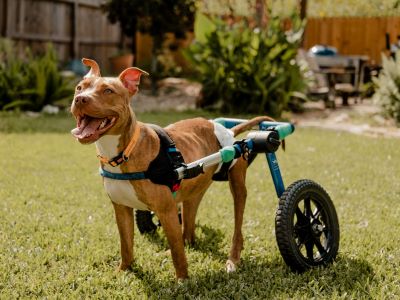You love your dog and you want them to have the best sleep possible. That’s why you bought them a cozy bed that matches their size, shape, and personality. But sometimes the bed is too hot for them and the floor provides some sort of cooling.
Why is my dog suddenly sleeping on the floor? Is something wrong with your dog or their bed? Should you be worried or let them be?

In this article, we will answer these questions and more. We’ll give you the reasons why does your dog suddenly sleeping on the floor as well as tips for getting them to use their beds.
You’ll also get some advice on how to make your dog’s bed more inviting and cozy. You will know more about your dog’s sleeping patterns and how to change them by the time you finish reading this article.
Contents
Why Does My Dog Suddenly Sleeping on the Floor?
Dogs spend a lot of time sleeping, and their sleeping positions can tell us a lot about their mood, health, and personality. Some dogs like to curl up in a ball, some like to stretch out on their backs, and some like to rest their heads on their paws.
There are several possible reasons for why dogs choose to sleep on the floor, and not all of them are unfavorable. The floor may occasionally seem colder, cozier, or more secure to dogs, which may explain their preference for it.
Occasionally, dogs may avoid their beds due to conditions in their environment, their behavior, or their health. For you to provide your dog the finest care and comfort, it’s critical to comprehend the reason behind their preferred resting position.
1)Medical Issues
One of the first things you should consider when your dog sleeps on the floor is whether they have any medical issues that might make them uncomfortable on their bed.
Some medical conditions can cause pain, itching, inflammation, or overheating that can make dogs avoid their beds. For example:
1. Arthritis: Dogs with arthritis might find it hard to get in and out of their beds or to adjust their position comfortably. They might prefer the floor because it offers more support and stability for their joints.[1]

2. Allergies: Dogs with allergies might experience skin irritation or respiratory problems that can make them uncomfortable on their beds. They might prefer the floor because it has less dust, dander, or other allergens that can trigger their symptoms.
3. Skin infections: Dogs with skin infections might have wounds, sores, or scabs that can make them uncomfortable on their beds. They might prefer the floor because it is cooler and less likely to irritate their skin.
If you suspect that your dog has a medical issue that makes them sleep on the floor, you should consult your veterinarian as soon as possible.
They can diagnose and treat your dog’s condition and advise you on how to make your dog more comfortable.
2)Behavioral Issues
Another possible reason why your dog sleeps on the floor is that they have some behavioral issues that make them avoid their beds.
Some behavioral issues can cause anxiety, stress, fear, or boredom that can make dogs prefer the floor over their beds. For example:
1. Anxiety: In some situations or environments, nervous dogs may feel uneasy or afraid. It’s possible that they prefer the floor because it gives them a safer and more secure feeling.
2. Stress: Stressed dogs may feel irritated or overwhelmed by numerous aspects of their existence. Because it makes them feel more at ease and able to handle their emotions, they might prefer the floor.

3. Fear: Dogs who are afraid may have gone through trauma or abuse, which makes them fearful of particular things or locations. It’s possible that they prefer the floor because it makes them feel less exposed and defenseless[2]
4. Boredom: Dogs who are bored may not be receiving enough mental or physical stimulation during the day. They could prefer the floor over their mattresses since it has more variety and excitement.
If you think that your dog has a behavioral issue that makes them sleep on the floor, you should seek professional help from a trainer or a behaviorist.
They can help you identify and address the root cause of your dog’s behavior and teach you how to modify it.
3)Environmental Factors
Another possible reason why your dog sleeps on the floor is that they are influenced by some environmental factors that affect their sleeping preferences.
Some environmental factors can include temperature, humidity, noise, light, or smell that can make dogs choose the floor over their beds. For example:
1. Temperature: Dogs might sleep on the floor because it is cooler or warmer than their beds depending on the season.
During summer, dogs might seek out cold surfaces to cool down their body temperature. During winter, dogs might seek out warm spots to conserve their body heat.
2. Humidity: Dogs might sleep on the floor because it is more humid or dry than their beds depending on the weather.
High humidity can make dogs feel sticky and uncomfortable on their beds. Low humidity can make dogs feel dry and itchy on their beds.
3. Noise: Dogs might sleep on the floor because it is quieter or louder than their beds depending on the location. Some dogs might like to sleep in a quiet place to avoid distractions and disturbances.
Some dogs might like to sleep in a noisy place to stay alert and aware of their surroundings.

4. Light: Dogs might sleep on the floor because it is darker or brighter than their beds depending on the time of day. Some dogs might like to sleep in a dark place to reduce stimulation and promote relaxation.
Some dogs might like to sleep in a bright place to enjoy the natural light and warmth.
5. Smell: Dogs might sleep on the floor because it smells better or worse than their beds depending on their preference. Some dogs might like to sleep in a place that smells familiar and comforting.
Some dogs might like to sleep in a place that smells new and interesting.
If you notice that your dog sleeps on the floor because of some environmental factors, you can try to adjust them to make your dog more comfortable.
You can change the bedding, location, ventilation, or lighting of your dog’s bed to suit their preference.
Tips for Encouraging Your Dog to Sleep on Their Bed
Your dog may not necessarily struggle from sleeping on the floor, but for a variety of reasons, you would prefer that they do it on their bed. You may believe that their bed is more cozy, sanitary, or secure for them.
If you share a bed or sofa with them, you might also want them to sleep on their bed for your convenience. If you want to encourage your dog to sleep on their bed, here are some tips you can follow:
1) Choose the Right Bed
The first step is to choose a bed that suits your dog’s size, shape, and sleeping style. You should also consider the material, padding, and design of the bed and how they affect your dog’s comfort and preference.
You can ask your veterinarian or a pet store staff for recommendations on the best bed for your dog.

2) Make the Bed Appealing
The next step is to make the bed appealing for your dog by adding some treats and rewards. You can put some of your dog’s favorite toys, treats, or blankets on the bed to entice them to use it.
You can also praise and pet your dog when they go near or lie on the bed to reinforce their positive association with it.[3]
3) Be Consistent and Patient
The last step is to be consistent and patient with your dog as they learn to use their bed. You should not force or scold your dog if they don’t want to sleep on their bed.
You should also not let them sleep on the floor if you want them to use their bed. You should gently guide and encourage your dog until they get used to sleeping on their bed.
FAQs
Why do dogs change their sleeping location?
Dogs change their sleeping location for various reasons, such as temperature, comfort, space, health issues, feeling secure, personal preference, and relationships with other family members. Dogs might seek out different spots to sleep depending on the season, their mood, their needs, and their environment.
Why is my dog laying on the floor and not moving?
Your dog laying on the floor and not moving could be a sign of a serious medical problem that requires immediate veterinary attention. You should also try to keep your dog calm and comfortable until you get professional help.
Is it bad for dogs to sleep on the ground?
Sleeping on the ground is not necessarily bad for dogs, as long as they are comfortable and protected from the elements. Some dogs might prefer the ground because it feels cooler, more comfortable, or more secure than their beds.
How do I get my dog to stop sleeping on the floor?
To get your dog to stop sleeping on the floor and use their bed instead, you should understand why they prefer the floor and address these issues by choosing the right bed for them, making it appealing for them, and being consistent and patient with them.
Conclusion
Sleeping on the floor may not always be terrible for your dog, it might be a sign of underlying problems that require your attention. For reasons of uncomfortable temperatures, comfort, or security, dogs will probably feeling a little overheated and likes the coolness the floor provides.
Understanding the reason behind your dog’s preferred sleeping pattern can help you give them the greatest care and comfort possible.
See your veterinarian or a certified dog trainer as soon as you believe that your dog is sleeping on the floor due to an injury or illness.
We hope this article has helped you understand why is your dog suddenly sleeping on the floor and how to encourage them to sleep on their bed. As long as your dog is happy and healthy, you don’t have to worry too much about where they sleep. Thank you for reading!
References:
- Anderson, K. L., Zulch, H., O’Neill, D. G., Meeson, R., & Collins, L. M. (2020). Risk Factors for Canine Osteoarthritis and Its Predisposing Arthropathies: A Systematic Review. Frontiers in Veterinary Science, 7. – NCBI
- Dacvb, W. S. M. P. D. (2022). Extreme Fear and Anxiety in Dogs.- PetMD
- WebMD Editorial Contributors. (2021, March 2). How to Choose the Right Bed For Your Dog. WebMD. Retrieved June 9, 2023, from- WebMD

Dania is a dog groomer living in California, who loves styling dogs. She often uses dog accessories to keep them distracted while grooming. She is also a dog parent to a Pomeranian, Duke. It’s because of him she is always on a lookout for the best dog foods, toys, other dog accessories, and ways to keep him equipped, healthy and happy.


